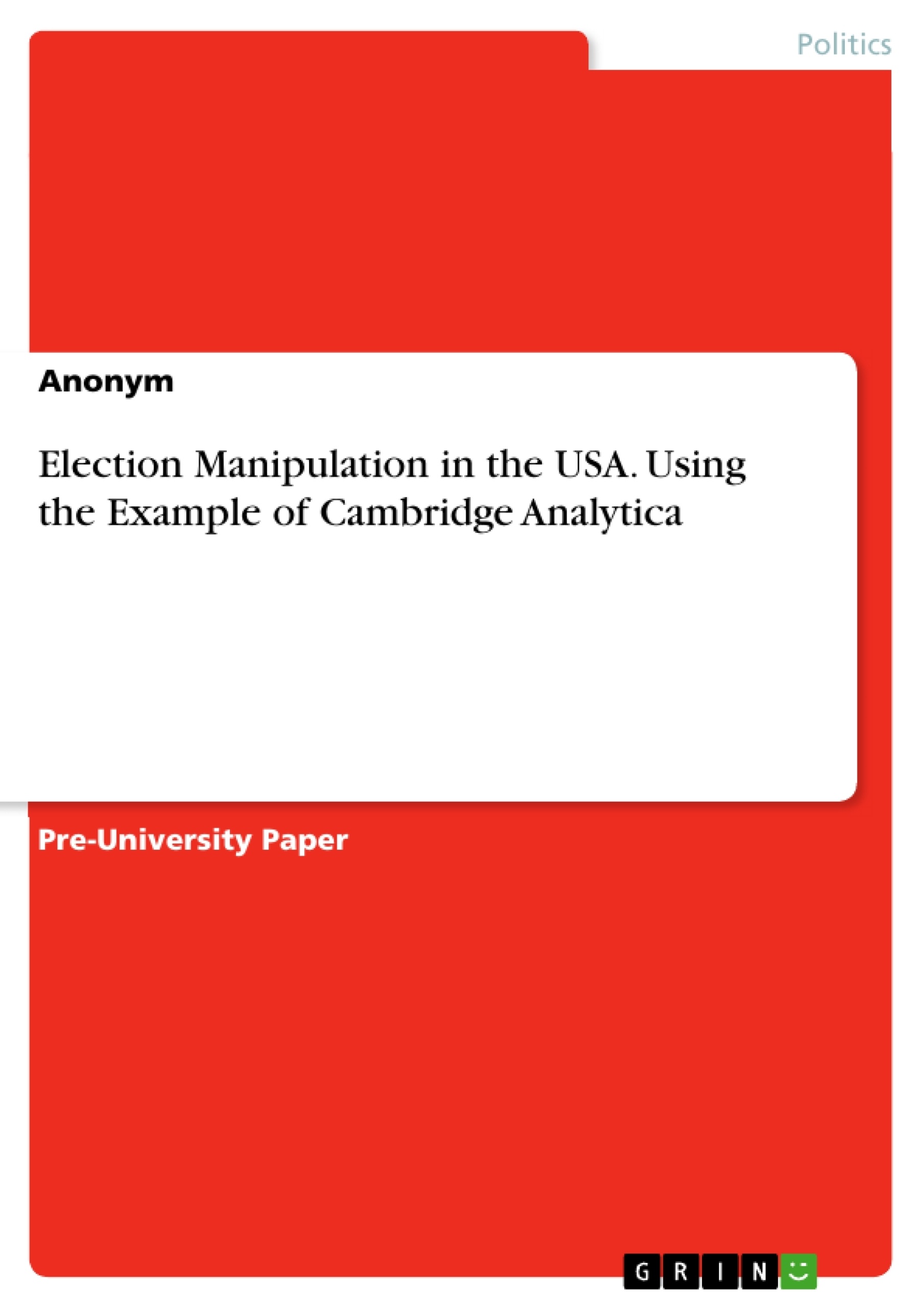This paper questions if democratic elections are still even possible at all. The goal of this paper is to explain which methods Cambridge Analytica used to try to influence the 2016 presidential election. In that course, it aims to answer the question if these practices are a threat to democratic elections. The company in question was called Cambridge Analytica, a data analysis and political consulting company which used user data from Facebook and other social media services to manipulate voters' behaviour.
It is the 8th November 2016, day of the 58th presidential election in the United States of America. The republican Donald Trump and his vice president candidate Mike Pence are competing against the democrat Hillary Clinton and her vice president candidate Tim Kaine. According to surveys and polls prior to the election, Clinton has higher chance of winning and is expected to become the 45th president of the United States. A big surprise was revealed to the world that day when, for the fourth time in American history, a presidential candidate was elected without actually having the majority of citizens' votes. Donald Trump won the election and took office as the 45th president of the United States on January 20, 2017.
But what if this election was possibly manipulated? What if a single company had the power and the possibilities to completely analyse, predict and influence voters' behaviour? This might sound like an idea from a science fiction movie, but it is reality and it happened without the world even realising it.
After dealing with the case of Cambridge Analytica, one might think that electoral manipulation using data seems to be alarmingly easy in the digital age.
Inhaltsverzeichnis (Table of Contents)
- Introduction
- What Cambridge Analytica Was and What They Did
- The Company's History
- Key Actors in the Trump Campaign
- Alexander Nix
- Aleksandr Kogan
- Christopher Wylie
- Cambridge Analytica's Methodology
- Microtargeting
- Psychographics and Demographics
- The OCEAN-Model (Big Five Personality Traits)
- How Cambridge Analytica Practically Applied their Methodology in the Trump Campaign
- A Threat to Democracy?
- Definition Democracy
- Discussing the Initial Question
- Conclusion
Zielsetzung und Themenschwerpunkte (Objectives and Key Themes)
This paper aims to analyze the methods employed by Cambridge Analytica to influence the 2016 US presidential election. Specifically, it seeks to determine whether these practices pose a threat to democratic elections.
- The history and operations of Cambridge Analytica
- The methods used by Cambridge Analytica to manipulate voters' behaviour
- The ethical implications of data harvesting and manipulation
- The potential impact of such practices on democratic elections
- The role of social media platforms in facilitating data manipulation
Zusammenfassung der Kapitel (Chapter Summaries)
The introduction sets the scene for the paper by discussing the 2016 US presidential election and the surprising victory of Donald Trump. It introduces Cambridge Analytica as a data analysis and political consulting company that allegedly manipulated voters' behaviour.
Chapter 2 provides an overview of Cambridge Analytica's history, highlighting its origins as a subsidiary of SCL (Strategic Communication Laboratories). The chapter also details the key actors involved in the company's operations, particularly those related to the Trump campaign, including Alexander Nix, Aleksandr Kogan, and Christopher Wylie.
Chapter 3 delves into Cambridge Analytica's methodology, exploring techniques such as microtargeting, psychographics, and demographics. The chapter discusses the OCEAN-Model (Big Five Personality Traits) and explains how Cambridge Analytica applied these methods in the Trump campaign.
Schlüsselwörter (Keywords)
The primary keywords and focus topics include: Cambridge Analytica, data manipulation, election manipulation, microtargeting, psychographics, demographics, OCEAN-Model, data privacy, democratic elections, Facebook, social media, political consulting, Trump campaign, and the 2016 US presidential election.
- Quote paper
- Anonym (Author), 2022, Election Manipulation in the USA. Using the Example of Cambridge Analytica, Munich, GRIN Verlag, https://www.grin.com/document/1322832




